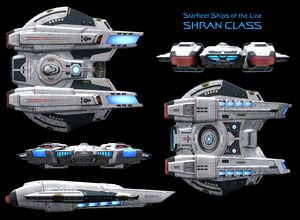Shran Class
More actions
The Shran-class escort is a well-rounded tactical vessel combining aspects of several other escorts and frigates, intended to be a ubiquitous patrol vessel for the dawn of the 25th century. Designed with lessons learned from the Defiant and Saber classes, this class serves alongside the larger Reliant-class frigates and Gagarin-class heavy escorts in border and space lane patrol duties, with crew comforts and exploratory equipment the more powerful Defiant and older Saber both lack. The Shran matches the firepower of the Defiant with significantly enhanced endurance and versatility.
Science & Exploration
The Shran is deployed throughout Federation space and has finely-tuned sensors for detecting and identifying other starships at relatively long range. These sensor arrays are also useful for stellar mapping duties, which these ships perform in the course of their other duties. Unusually for an escort, there are two large sensor platforms on the ventral, forward ends of the ship's two nacelles and a large planetary sensor array in the center of the ship. Intended to allow the Shran to ferret out boltholes and hideaways used by raiders and pirates in asteroid fields, this equipment is very effective at finding life forms and metallic masses, though members of this class are generally not equipped with the corresponding computer equipment necessary for full-on detailed scientific surveys. These ships also have two standard science labs, which are configured to easily perform forensic or customs-related analyses (like verifying the composition of cargo) to complement their patrol missions, but they can also be used for light-intensity scientific tasks.
Shran-class ships have much greater endurance and range than the Defiant-class escort, thanks to larger fuel reserves and better crew comforts, and so their captains are often allowed to linger for a few weeks performing surveys or prospecting on their way back to their home port after being relieved. The USS Shran herself actually performed an unexpected first contact on her shakedown cruise when her powerful, new sensor arrays detected a subterranean civilization on what otherwise appeared to be a dead, class-D moon. With their ability to land on planetary surfaces, these ships can also handle missions in hostile environments that other vessels can't, especially when transporter functions aren't available.
Diplomacy
Shran-class starships are not equipped for complex diplomatic missions. Like most ships of her size, she does have modest guest quarters and a conference lounge, but it would be extremely unusual for a ship of this class to be Starfleet's first choice for a diplomatic assignment. Their relatively high speed can allow them to serve as couriers, moving either important diplomats or diplomatic packages. At least a few members of this class, like the prototype Shran mentioned previously, have been forced into diplomatic roles by necessity, and their captains are very aware of the limits their ships have for such tasks. Because of their presence on the frontier, Shran-class starships do frequently interact with vessels from outside the Federation in a customs enforcement or border security capacity. While the Federation does not generally restrict traffic through its space, it does monitor the comings and goings of foreign starships, and the Shran is one of a number of different classes that are tasked with identifying the intentions of such ships, especially those suspected of containing contraband material.
Engineering
The Shran-class escort shares design features with the Defiant-class and the much older McGee-class surveyor. Designed to present a small target profile, the ship has a roughly circular saucer section into which her two nacelles are directly embedded. These oversize nacelles provide substantial sprint speed. The deflector assembly is borrowed almost directly from the Defiant and contains the forward docking port. Impulse engines flank a single aft shuttle bay, and these engines draw their power from a combined warp-impulse reaction assembly with a large power modulation crystal visible amidships. Unlike the Defiant, the Shran has windows, a design feature made possible through advances in armor technology and a desire to strike a balance between tactical performance and crew comfort.
Shran-class systems are well-tested and great emphasis has been placed on making sure that this design does not become a "hanger queen" the way that the Defiant often has become due to maintenance needs. A trade-off for ease of maintenance means that limitations have been placed on the Shran's overall power output, meaning that despite being twice the size of the Defiant, her weapons are not commensurately more powerful, but advances in warp engine technology have not resulted in speed losses. The Shran also shares many components in common with her contemporaries, the Reliant and Gagarin. Like the Defiant, the Shran is capable of planetary landings.
Tactical
As an escort, the Shran is well-armed and geared for defensive missions. She uses a combination of ten standard phaser arrays and four pulse phaser cannons to improve her firing arc coverage compared to the Defiant and her overall firepower compared to the Saber, which only uses arrays, matching the Defiant in raw forward firepower. Four torpedo launchers forward and two aft provide substantial launch capabilities, but their magazines are limited by the ship's small size. A Shran is more than capable of outmaneuvering most threats to keep them in her forward arc, thanks to large thruster quads on the edges of the saucer. The shields aboard a Shran are stronger than those on a Defiant, but her hull is less heavily armored, so she must be even more careful to avoid direct hits.
Being more reliable and having greater range than the Defiant, the Shran is a good choice for deep space patrols, though not to the level at which the Manticore or Prometheus would be. They have an advantage over these more powerful ships in terms of optics, as their more versatile design is less likely to escalate a situation because Starfleet can credibly assert that a Shran is in an area for exploratory reasons. With total combat potential exceeding two Saber-class starships at a minimum, the Shran is more than capable of conducting patrol missions on her own, which provides further flexibility to the fleet by freeing other vessels up for exploratory duties. In fleet scenarios, Shrans use their high speed and forward firepower to screen larger starships. They were intended to work alongside Reliants and Gagarins in highly mobile squadrons to take on threats from raiders or pirates, with a Gagarin as flagship and several Shrans supporting a core of a few Reliants. They are also deployed as support vessels for outlying stations.
Like some other vessels built in the late 2390s, the Shran has the capability to deploy novel weapons systems through a set of eight hatches, four ventral and four dorsal on either side of the warp nacelles. These hexagonal hatches connect to a hold. They can be used to deploy mines or other specialized ordnance, as well as probes or surveillance drones. Unlike the vertical launch tubes on the Gagarin, these hatches can also serve as cargo loading ports and can be used to deploy workbees for repairs. They are also designed to be held open to allow for mission-specific sensor arrays or other equipment to be mounted there. The lower hatches also serve as the disembarkation point when the ship is landed.
Shipboard Life
Where the Defiant is a pure gunboat with crew accommodations crammed in between the ship's tactical systems, resulting in smaller corridors and no privacy, the Shran is very similar to any other small 25th-century Starfleet vessel. The interior is warm and welcoming, though there are fewer bespoke crew facilities than on larger ships. Crew members are typically assigned to staterooms rather than bunk rooms, though there are some residential hallways for the most junior crewmembers. Senior officers' quarters even have windows. Shrans have two holosuites, as well as a large lounge on deck two with three floor-to-ceiling viewports, a marked improvement over her predecessors. These interior design choices reflect a Starfleet ethos that is once again willing to prioritize crew needs as being just as important to a ship's mission as her tactical systems. This is also seen in the ship's medical facilities, which have a full sickbay and medical lab, making it so there is no need to rush home to port for emergencies in the way that a Defiant must.
There is no getting around that Shran-class starships are intended for tactical roles, but their greater accommodation standard than earlier escorts can help their crews forget this. The fact that they are also capable of some scientific missions also makes them more popular with a wider variety of personalities, and their relatively good endurance means that crews often stick together for longer periods. Many potential crewmembers are drawn to these ships for the potential to be out on the frontier of Federation space rather than taking the path to its interior on a California-class ship as so many new officers do.
Shran Class History

This project was stalled many times, due to the Romulan evacuation and due to Starfleet's priorities largely staying with larger designs like the Odyssey and Inquiry. In the interim, the Aquarius was developed as a complement to the Odyssey and overall refinement of the Defiant, but it did not have the range to be truly independent. By the mid-2390s, it was clear that there remained a need for a smaller tactically-oriented ship to go beyond the capabilities of the Saber without being as resource-intensive or limited in function as the Defiant.
Starfleet green-lit the Shran design in 2398. Sharing components with other newer classes and relatively easy to build, the first vessel of this class came online two years later in 2400 for a year-long shakedown cruise. Production was approved during the middle of this cruise, as two of the other prototypes entered service. The Shran is now a popular patrol vessel for outlying areas.
The Shran Class In-Play
- Shran-class starships are similar in role to the Defiant, with more versatility and comfort. They represent Starfleet's current ethos, understanding the need for defensive ships but not wanting to create warships. A Defiant is like a submarine or a World War II destroyer on the inside, but the Shran has the same facilities and feel of a larger ship.
- The Reliant is also a patrol-oriented design, but it's a lot larger and more versatile than the Shran, while also being less powerful in combat. These two classes work in tandem with the Gagarin, which is larger and more powerful than either of them.
- Similar in size to the Saber, the Shran is much more modern and powerful.
- This ship is a good choice if you want to mix traditional Star Trek stories alongside more combat-oriented ones.
